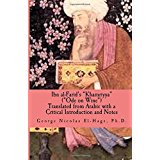Ibn al-Farid's "Khamriyya" ("Ode on Wine")
In Arabic literature and philosophy, mysticism is one of the most significant traditions. The fountainhead of Sufism in Islam is still a debatable issue. The Persians had many famous mystic poets. Arabic literature has only one great mystical poet of pure Arabic descent worthy to stand next to the Persian masters: Sharaf ad-Din ‘Umar Ibn ‘Ali as-Sa’di, known as Ibn al-Farid, or the Notary’s Son (1181-1253), who was born in Cairo. He was dedicated from early manhood to the mystic’s method of withdrawal from the world. He was utterly satisfied in later life to remember with ecstatic pleasure the pilgrimage he had made to Mecca, and to meditate upon the union with the spirit of the Prophet which he had then experienced. Ibn al-Farid’s Diwan of mystical odes, which was first collected by his grandson, is small in comparison with similar works of Persian mystics. The Diwan could be viewed as a collection of homogeneous poems expressing the ecstasy and longing of a devoted lover to become one with his beloved. It is equally conspicuous to assume that with the exception of the “Khamriyya” and “The Poem of the Way”, the bulk of Ibn al-Farid’s Diwan should be read simply as love poetry void of any mystical and spiritual overtones. In the mean time, it would equally be an exaggeration to adopt Nabulsi’s argument which maintains that Ibn al-Farid did not harbor a thought without spiritual implications. Ibn al-Farid’s Diwan may well be considered “a miracle of literary accomplishments.” If all critics seem to agree that “al-Ta’iyyatu’l-Kubra” is his masterpiece, we can safely say that the “Khamriyya” is the second “jewel” in the collection. It is a masterpiece in its own right, and one of the longest poems after “The Poem of the Way”. In this piece, every word is transparent. Every word is a world bathing in tradition, carrying two meanings or more. The symbolism of “Khamriyya” is not to be found in any other poem of the poet’s collection. Love is the “wine of life”; the “Khamriyya” dedicated to this divine wine, stands in its own right as an incomparable masterpiece in the history of Arabic mystical poetry.

